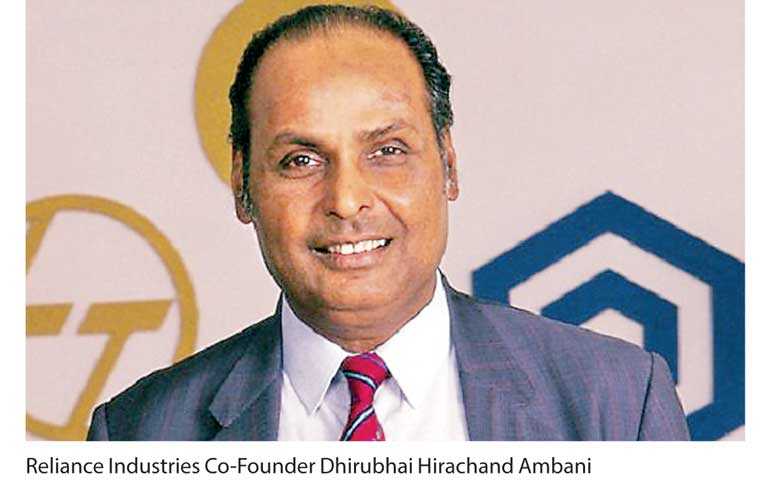Sunday Feb 15, 2026
Sunday Feb 15, 2026
Friday, 6 July 2018 00:00 - - {{hitsCtrl.values.hits}}

 “Give the youth a proper environment. Motivate them. Extend them the support they need. Each one of them has infinite source of energy.
“Give the youth a proper environment. Motivate them. Extend them the support they need. Each one of them has infinite source of energy.
They will deliver”
– Dhirubhai Ambani
The above is the seminal declaration of one of the wealthiest men of India, Dhirubhai Hirachand Ambani who is the Co-Founder of Reliance Industries. What stands out on its own rights, from these words, is Ambani’s belief that every young person is an individual that embodies what he identifies as an “infinite source of energy”.
He further proclaims that if young people are provided with the suitable atmosphere and granted the necessary support required, they would become the best version of themselves and thereby “deliver” through the realisation of personal potential.
This statement by one of the most successful men in the world, is an apt encapsulation of the existing predicament experienced by young people in the status quo, especially those living in developing countries such as Sri Lanka, where the capacities and talents of young populations are undermined by existing politico-social, economic and cultural factors.
Living in the 21st century; an age of technological enlightenment and landmark strides in all fields of life imaginable, young people find themselves in a constant state of stimulation and inspiration. Added to that, exists the constant social pressures of finding oneself a clear cut life path and set career goals in an age where 30 under 30 is the latest trend.
Young entrepreneurs that have circumnavigated the tertiary education process and found companies of their own, Ivy League acceptance of 13-year-old prodigies, 17-year-old football players that have made it to the big leagues, and such, constantly dot mass media which idolise young achievers in the hope of providing inspiration to those still finding themselves, as well as younger generations. However, such intended sources of inspiration in most cases have a contrary impact, as many young people dwell into spirals of existential crises, where they view themselves to be constant failures.
Why is it that in an era of opportunity and stimulus, young people often find themselves lost for direction? Or in a more dire state of affairs, lost for individuality and creativity? There are several reasons for this. The most predominant reason is the existing primary and secondary education systems which highlights the importance of memory and scientific inclination.
Our school memories are attached to regimented syllabi, strict time tables and periods: a system where we are grouped according to our years of birth as if the only commonality amongst our batch mates is the years that we were manufactured as human beings. The existing system stifles individuality and creativity at a very young age which sets precedent to the fact that one is only a “good” student (or a good kid for that matter) if one excels in standardised testing and adheres to strict school rules.
The more alarming fact is that, children who do not fall into this mechanism of education, are often predicted to be inevitable failures or in certain cases diagnosed as having conditions of mind such as Attention Deficiency Hyperactive Disorder (ADHD), and prescribed numbing drugs such as Ritalin.
Another reason for the constant sense of inadequacy and unfoundedness, is the mismatch between the primary and secondary education system with university deliverables, as well as the mismatch between the skills provided by tertiary education and the expectations of the reformed job market.
It must be accepted that long gone are the days in which a paper qualification secured you a viable job opportunity. Employers of today value people’s skills, ability to innovate and think outside the box, along with a candidate’s EQ, over a Bachelors’ Degree, which has become the norm rather than a qualifier. Yet the dilemma lies in the fact that students are often forced to follow a subject stream in university which is in line with the selected stream they completed at an A/L or high school level.
Furthermore, the tertiary level of education requires academic commitment and intellectual thinking which is not part of the expectations in lower level education, hence students often experience an educational culture shock.
A third reason that can be quoted in this analysis of why young people often lose their individuality in status quo, is the lack of job satisfaction that they experience when they enter the job market. With the exception of tech companies and startups, most corporates and conglomerates follow a strict culture that involves an eight to five white collar jobs of number crunching or documentation. Such strict systems and job-related deliverables, leave young people dissatisfied in jobs, which has in turn created a trend where youth move from field to field in expectation of discovering a trade that would retain their interests.
Amongst many other causes, another factor that must be highlighted is the lack of focus of political leadership on young people as a group of special interest. The needs of youth populations become a much discussed topic during election times, where politicians hoping to succeed, point fingers at their predecessors and allege that they have failed the youth of a country.
Promises are made by incoming leaders who attract young votes in their constituencies, through materialistic gifts and promises of job placements. Such commitments are often forgotten post to the securing of power. Hence, the youth are seen as a political tool only useful to attain and retain power, rather than an asset of a country, which, if guided properly, can indeed perform miracles.
All these factors leave young people feeling as if they themselves are the causes of their predicaments. They feel betrayed by the existing system and society which lead them to feel unfulfilled and lost in translation. It is essential that we urgently reform this sad state of affairs and commit ourselves as a population of global citizens, towards a reformation of mindset and systems.
It is of paramount importance that we commit ourselves towards creating a suitable environment in which the youth of a country may become their best selves, because the youth are not only the future of the world but also the makers of the past and the present.
As the Founder of Alibaba, Jack Ma says: “Help young people. Help small guys. Because small guys will be big. Young people will have the seeds you bury in their minds, and when they grow up, they will change the world.”
(Chiranthi Senanayake, a passionate youth activist, is an NYMUN blogger and a past Head Prefect of Ladies College. She is currently a student of Sri Lanka Law College. Chiranthi was awarded a Best Delegate award at NYMUN in 2016 and one year later in 2017 she went onto be selected as Sri Lanka’s official youth delegate to the United Nations for the 71st UN General Assembly.)
(UNLOCKED is a space for Sri Lankan youth to express their views and opinions on development with the aim of creating positive change in the world. The views expressed in the blogs are solely those of the authors. UNDP Sri Lanka and Daily FT does not represent or endorse the views expressed in these blogs. Read more about the UNLOCKED initiative www.lk.undp.org.)